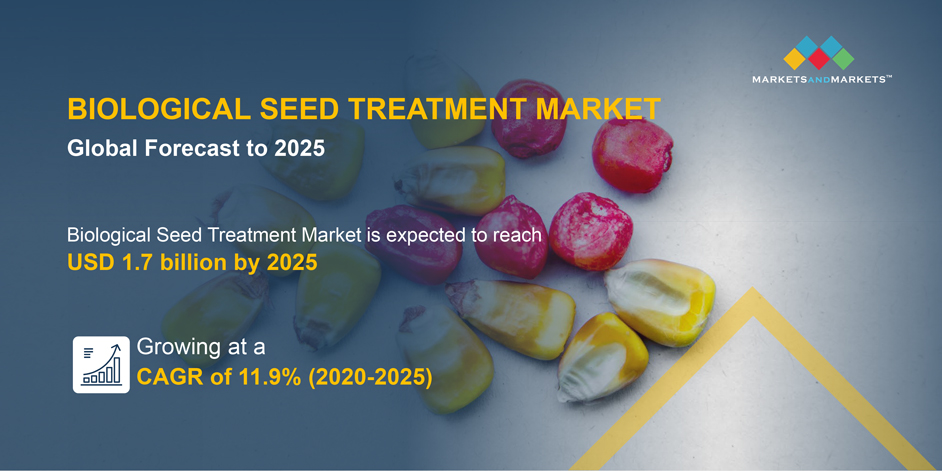The biological seed treatment market is projected to reach USD 1.7 billion by 2025, and it was valued at USD 0.9 billion in 2020. It is expected to grow with CAGR of 11.9%. The market is influenced by the adoption of sustainable agricultural practices, along with strong investments being made by major market players in the research and development of these products. The agricultural and environmental benefits associated with these biological seed treatment solutions are the major factors contributing to the growth of this market globally. Beneficial microorganisms and plant extracts are projected to act as important tools that could help reduce the usage of synthetic fertilizers and chemical pesticides, thereby reducing the investments by farmers and environmental risks.

Download PDF Brochure:
https://www.marketsandmarkets.com/pdfdownloadNew.asp?id=162422288
Driver: Environmental concerns associated with chemical seed treatment
The demand for biological seed treatment has significantly increased as a result of high awareness of their potential and the growing attention to the environmental and health risks associated with conventional chemicals. Chemical seed treatments are detrimental to the environment and pose a serious risk to pollinators. The neonicotinoid class of insecticides is considered highly toxic to honeybees. Microorganisms employed as active substances in pest management are recognized as generally safe for the environment and non-target species, in comparison with synthetic chemicals.
The Microbial segment is projected to be the largest and fastest growing type of biological seed treatment market during the review period, in terms of value.
The biological seed treatment is categorized into two types namely microbial and botanicals. The microbial segment accounted for the largest share in the global biological seed treatment market due to the higher demand for biofungicides and bioinsecticides. These microbial seed treatments is carried out by beneficial microorganisms which can reduce the fertilizer and pesticide applications and increases the yields, with economical price.
Fastest-growing segment by function: Seed protection segment
On the basis of function, the global market has broadly been segmented into seed enhancement and seed protection. Biological seed treatments aimed at seed protection provide targeted control of certain pests and fungal diseases during the early seedling stage. Biological seed treatments are used on multiple crops to control a variety of pests. It ensures uniform stand establishment through defense against numerous soil-borne pathogens and insects.
Request Sample Pages:
https://www.marketsandmarkets.com/requestsampleNew.asp?id=162422288
North America region’s increasing preference for high quality produce
The increasing agricultural practices and requirement of high-quality agricultural produce are factors that are projected to drive the biological seed treatment market growth in this region. The government policies adopted by developed countries for the ban on key active ingredients are the major factors encouraging the growth of this market in North America region. Hence, North America is projected to be the fastest-growing region in the global market. RD investments for the development of biological seed treatment and installation of new production capacities by key players are projected to drive the market growth in the next five years.
Key players in this market include BASF SE (Germany), Bayer AG (Germany), Novozymes A/S (Denmark), Syngenta Group (Switzerland), Corteva Agriscience (US), Valent BioSciences (US), Verdesian Life Sciences (US), Plant Health Care (US), Precision Laboratories (US), Koppert Biological Systems (Netherlands), and Italpollina (Italy).


